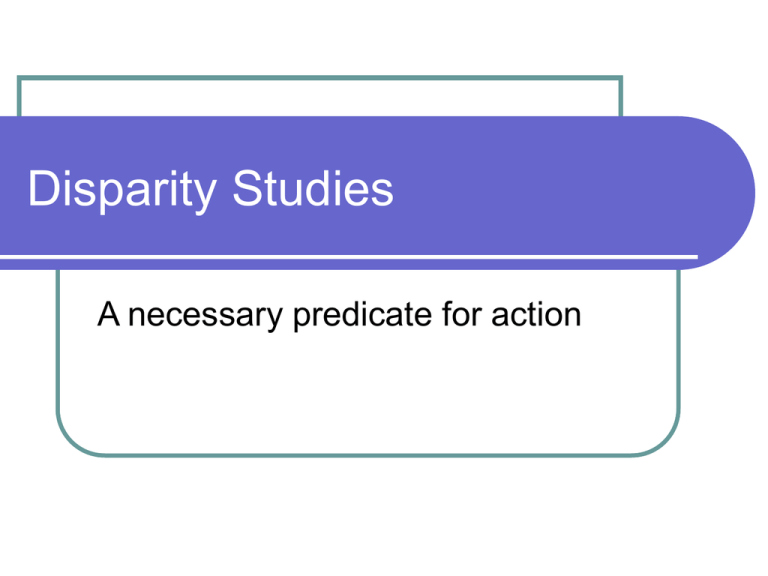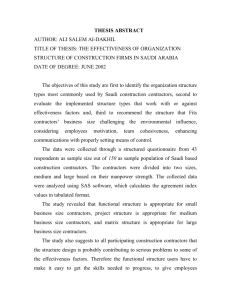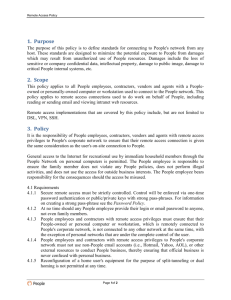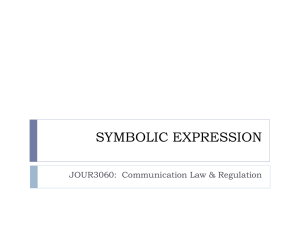Croson - BoardDocs
advertisement

Disparity Studies A necessary predicate for action The request (excerpt) The request (excerpt continued) City of Richmond, Appellant v. J.A. Croson Company 1989 If the city of Richmond had evidence before it that nonminority contractors were systematically excluding minority businesses from subcontracting opportunities it could take action to end the discriminatory exclusion. Where there is a significant statistical disparity between the number of qualified minority contractors willing and able to perform a particular service and the number of such contractors actually engaged by the locality or the locality's prime contractors, an inference of discriminatory exclusion could arise. Adarand Constructors, Inc. v. Pena 1995 It follows from that principle that all governmental action based on race--a group classification long recognized as "in most circumstances irrelevant and therefore prohibited," Hirabayashi, 320 U.S. at 100, should be subjected to detailed judicial inquiry to ensure that the personal right to equal protection of the laws has not been infringed. These ideas have long been central to this Court's understanding of equal protection, and holding "benign" state and federal racial classifications to different standards does not square with them. " Adarand Constructors, Inc. V. Pena Accordingly, we hold today that all racial classifications, imposed by whatever federal, state, or local governmental actor, must be analyzed by a reviewing court under strict scrutiny. In other words, such classifications are constitutional only if they are narrowly tailored measures that further compelling governmental interests. Croson Result in the 11th Circuit In this circuit, we have identified four factors that should be taken into account when evaluating whether a race- or ethnicity-conscious affirmative action program is narrowly tailored: In making this evaluation, we consider: (1) the necessity for the relief and the efficacy of alternative remedies; (2) the flexibility and duration of the relief, including the availability of waiver provisions; (3) the relationship of numerical goals to the relevant labor market; and (4) the impact of the relief on the rights of innocent third parties. ENGINEERING CONTRACTORS ASSOCIATION OF SOUTH FLORIDA INC (1997) Compelling Governmental interest Strict scrutiny for race based programs Statistical evidence must be based upon proper methods and data Must account for other factors that impact utilization Anecdotal evidence of little value Florida A.G.C. Council, Inc. v. Florida 2004 The Court followed Croson precedent and held that “where there is a significant disparity between the number of minority contractors willing and able to perform a particular service and the number of such contractors actually engaged by the locality or the locality’s prime contractors, an inference of discriminatory exclusion could arise.” Florida A.G.C. at 315 quoting Croson, 488 U.S. at 509. But the Court did not find the legislatures spending goals to fall into that constitutional exception because there was no proof of a disparity. Therefore following Croson, the court held the minority program unconstitutional because it was not narrowly tailored to serve a compelling government purpose, and it therefore violated the Equal Protection Clause of the Fourteenth Amendment. Florida A.G.C. at 316. Virdi v. DeKalb County School District 2005 The court held the MVP unconstitutional because it was not narrowly tailored: there was no evidence that the District considered race-neutral alternative means of tracking its activities to avoid unwitting discrimination, and the MVP’s racial goals were of unlimited duration. Hershell Gill Consulting Engineers, Inc., v. Miami-Dade County 2005 Non-minority engineering firms brought an action against Miami-Dade County challenging the constitutionality of their minority and women business enterprise program (MWBE) which established participation goals for minority and women business enterprises in awarding county architectural and engineering contracts. The Court found the program unconstitutional because it was not narrowly tailored to pass strict scrutiny. The court found the statistical survey results were unreliable, inaccurate, and unpersuasive, and therefore did not constitute a “strong basis” in evidence to pass strict scrutiny. Requirements to act Statistical evidence of discrimination must show that either the government’s own actions resulted in a significant disparity in purchasing, or that the government was a passive participant in discriminatory practices of private industry. The disparity study must control for race and ethnic neutral factors such as company size, financial capacity, etc. that would account for the statistical disparities. The statistics used must be deemed reliable – superficial analysis will not suffice. The government must seriously undertake race and ethnic neutral efforts in an attempt to rectify any desperate treatment. Any race or ethnic specific goals must be substantially related to the relevant market. If adopted, any such purchasing program must be implemented in a flexible manner. The program must have a finite duration.







